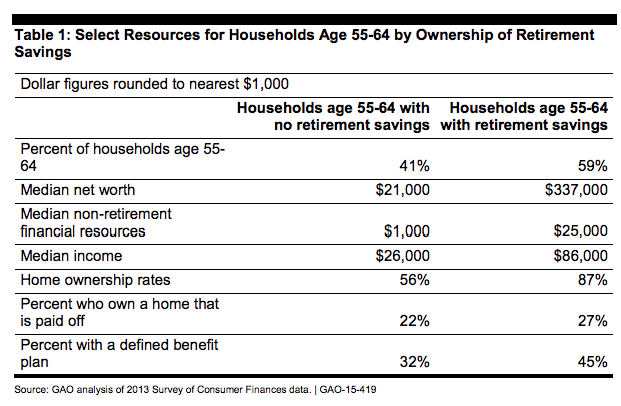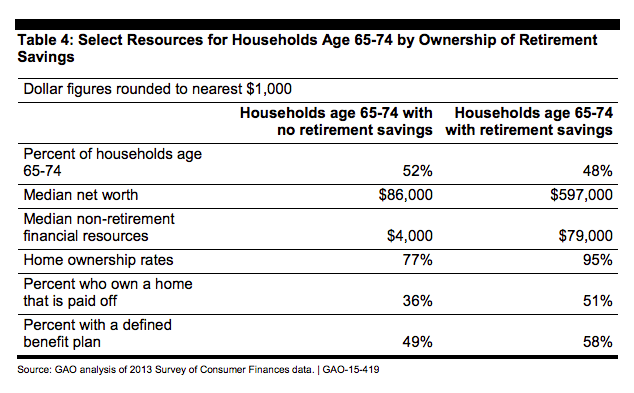Because our retirement years can span decades, saving for our golden years often looms large in our minds. Unfortunately, one of the traps many of us fall into is that we either procrastinate planning for retirement until it is right around the corner, or we fail to plan at all. One of the reasons for this lack of planning is the glut of contradictory and overwhelming advice. For example, we are told that we need X amount for a 20-year retirement, or that we should contribute X amount to our 401(k). The experts tell us to pay off all of our debt but make sure we have enough liquidity for emergencies.
How do you make sense of all this information based on your own unique situation? How do you know if you’re on track?
A Look At The Numbers
With Baby Boomers retiring every day, the Census Bureau predicts that the population aged 65 and over will grow 50% between 2015 and 2030. Because of this, the U.S. Government Accountability Office was tasked with finding out how well prepared American workers are for retirement. They published a comprehensive report in 2015 (1) that we can use to see if your retirement savings are on par with others your age.
Whether you think you’re on top of things or way behind, you may be surprised by what statistics show about retirement savings. Let these numbers serve you as either a pat on the back or an inspiration to get going.
If You’re Between The Ages Of 55 And 64
It may surprise you, but if you have at least $1 saved for retirement, you’re doing better than 41% of those surveyed, and if you have at least $25,000 saved, you’re in the top 59%. Though those numbers may make you feel good about yourself, they don’t guarantee you a comfortable retirement. While you may not know how much you need for retirement, we can be sure it’s more than $25,000.
Here is a table from the GAO’s report showing how resources are divided between households with and without retirement savings in this age group.

Clearly, those without retirement savings don’t have a lot to fall back on. Since they lack additional resources, they will be dependent upon pension plans and Social Security to carry them through their retirement years. Of the 59% that have saved, the median nest egg is only about $104,000. With increasing longevity and healthcare costs, that probably won’t be enough for a worry-free retirement.
In Table 2, you can see how much savers have actually managed to put away. Where do you fit in?

In this age group, it seems that only the very top savers are ready for retirement. Most of them are still working, though. What about those a decade older? How do you compare to those who have already reached retirement?
If You’re Between the Ages of 65 and 74
65 is a popular retirement age, though more and more people are extending this date so they can catch up with their retirement savings. Like the previous age group, this bracket doesn’t have much in savings. Here is a chart showing the exact same information as the previous age bracket.

In this age group, people are a little more prepared but with only a slightly larger nest egg. However, the median net worth has increased and homeownership rates are higher. Let’s look at their savings breakdown.

Surprisingly, the median amount saved is not significantly higher than that among people aged 55-64. It only increases from $104,000 to $148,000. The lower percentiles nearly double their savings. Where do you fall? If you’re in the 90th percentile, you’re sitting pretty and probably don’t have anything to worry about in retirement. But what about the lower percentiles?
It doesn’t take a whole lot of savings to look good relative to your peers. But how are your savings relative to your current lifestyle? Will you have enough to live the life you want, or do you need to double down and save more?
What Do You Want Your Retirement To Look Like?
No matter how you compare to your peers, you need to figure out how your savings compare to the cost of the retirement you desire. There are plenty of online retirement calculators available, but they are often generic and don’t take into account the various factors that will impact your personal situation.
The only way to have a clear idea of what you’ll need to retire comfortably is to have a financial advisor run a thorough analysis. A professional can utilize technology to show you different possible retirement outcomes and how to prepare for both the good and the bad.
How I Can Help
Without a retirement planning strategy, you could be forced to work longer, lower your lifestyle in retirement, have less for future generations, or not be able to afford the things you really want. No matter how much you have saved so far, you need to build wealth so you can enjoy your life today and save and invest for your later years. The best way to do that is by partnering with an experienced professional.
At Boston Metro Advisor, our goal is to help you get on track so you can experience a secure retirement. We want you to have the confidence that all aspects of your finances are being addressed so you can pursue a life with fewer worries and more time for your passions. Don’t keep yourself up at night wondering if you will have enough money to retire. Contact us at (781) 995-0253 or paulmcnulty@lpl.com for a no-obligation introductory meeting.
About Paul
Paul McNulty is the founder of Boston Metro Advisor with over 20 years of experience helping people navigate the ups and downs of the economy toward the financial future they envision. His education consists of a Bachelor of Science in business administration from the University of Rhode Island and the CERTIFIED FINANCIAL PLANNER™ (CFP®) professional designation.
Paul’s experience and education have made him a multi-faceted professional capable of assisting people with virtually all their financial needs. His services include every facet of retirement planning, from 401(k) rollovers and income planning to wealth management and estate planning. Paul has been active in his community over the years as a youth sports coach. When he’s not spending time with his wife, Cindy, and their two children, who are currently away attending college, Paul enjoys reading, playing golf, and fishing. Learn more about Paul by connecting with him on LinkedIn.
The opinions voiced in this material are for general information only and are not intended to provide specific advice or recommendations for any individual.\
__________

